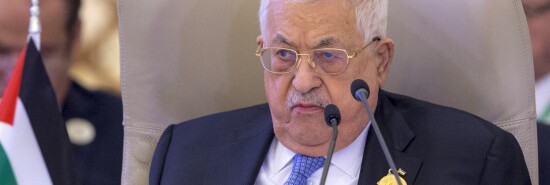
The Palestinian Authority is ill-prepared to govern Gaza
Sean Durns
Video Embed
Israel is making staggering gains against Hamas. The Jewish state has near total control of northern Gaza, and many top Hamas commanders have been killed or fled. Still, the “day after” will bring new challenges.
Some policymakers have suggested that the Palestinian Authority, the U.S.-backed entity that rules the West Bank, should rule the Gaza Strip after the war. But the PA is poorly positioned to do so. The authority is dominated by the Fatah movement, Hamas’s longtime rival for power. The PA’s president, Mahmoud Abbas, is the head of Fatah, as well as the Palestine Liberation Organization. Abbas is 88 years old and is in the 18th year of a single elected four-year term as president.
BIDEN-XI MEETING: CONGRESSIONAL INVESTIGATION OF COVID-19 ORIGINS LOOMS OVER US-CHINA RELATIONS
Abbas reigns in the West Bank, but he does not rule. Both he and his Fatah movement are deeply unpopular. Indeed, Abbas has refused to hold elections, knowing that he’d lose power. In 2021, facing a likely win by Hamas, Abbas simply canceled the vote. Iranian-backed proxies such as Hamas and Palestinian Islamic Jihad, among others, have been steadily building up a presence in the areas under PA control, hoping to seize power on Tehran’s behalf. Their rise has led to a sharp uptick in Israeli counterterrorist raids over the last few years, with Israel stepping up where the PA couldn’t or wouldn’t.
The PA was created by the 1990s Oslo Peace Process. In exchange for foreign aid and the opportunity for limited self-rule, PA leaders were required to “renounce the use of terrorism and other acts of violence.” Abbas’s predecessor, Yasser Arafat, also swore that Palestinian leaders would “assume responsibility over all PLO elements and personnel in order to assure their compliance, prevent violations and discipline violators.” Importantly, Arafat and his then-foreign envoy, Abbas, vowed to resolve outstanding problems with the Jewish state and to change the articles of the PLO’s covenant that “deny Israel’s right to exist.”
The PA broke its promises before the ink was even dry.
Arafat viewed Oslo as a deception: a stepping stone to gaining ground to destroy Israel while simultaneously getting much-needed funds after the collapse of the PLO’s chief patron, the Soviet Union. As he stated in a 1996 speech in Stockholm: “We plan to eliminate the state of Israel and establish a purely Palestinian state. We will make life unbearable for Jews by psychological warfare and population explosion. … We Palestinians will take over everything, including all of Jerusalem.”
Upon his arrival in Gaza in July 1994, an arrival made possible by the Oslo Peace Process, Arafat smuggled in Mamdouh Nawfal, a terrorist who masterminded the 1974 Ma’alot attack in which 27 Israeli children were murdered, in the trunk of his car. Instead of renouncing terrorism, the PA pays tax-deductible salaries to those who murder Jews. It names sports tournaments and streets after slain terrorists, and PA leaders like Abbas routinely praise terrorist attacks. There have also been several instances of U.S.-trained PA forces carrying out attacks themselves.
CLICK HERE TO READ MORE FROM THE WASHINGTON EXAMINER
Contravening its promise to resolve outstanding problems in negotiations, the PA has also rejected numerous U.S. and Israeli offers for statehood, including in 2000 at Camp David and in 2008 after the Annapolis Conference, among other occasions.
The PA not only lacks legitimacy with its own people, but it also lacks the will to fulfill its already existing obligations. Indeed, the PA’s unpopularity led to Fatah losing the 2006 elections to Hamas in Gaza. Absent serious reforms, a PA return to Gaza seems unlikely to bring peace for Israelis and Palestinians.
Sean Durns is a senior research analyst for CAMERA, the 65,000-member, Boston-based Committee for Accuracy in Middle East Reporting and Analysis.
